Oct 29, 2025. Weekly Dharma Assembly, Youth Festa Promotional Video Filming
Hello. Today is the day of the Weekly Dharma Assembly, where Jungto Society members gather once a week to reflect on their practice.
After completing his morning practice and meditation, Sunim worked at the Peace Foundation before heading to the Dharma Hall at the Jungto Social and Cultural Center for the live broadcast of the Weekly Dharma Assembly.
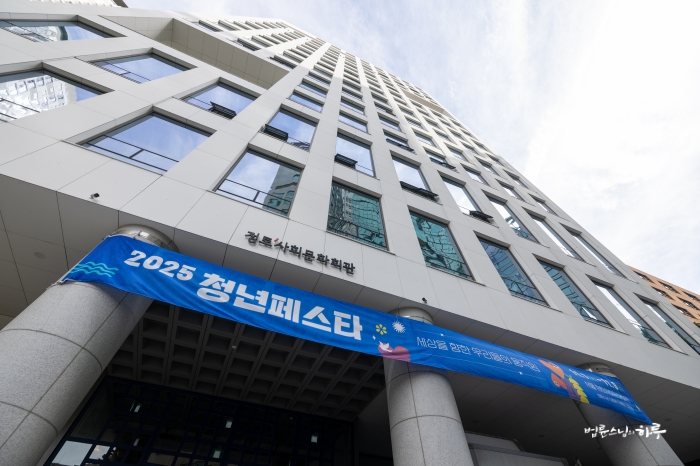
At exactly 10 AM, the Weekly Dharma Assembly began with the Three Refuges and the chanting of the Heart Sutra. About 100 people were present in the Dharma Hall, while approximately 4,000 Jungto Society members participated online.
First, the President of Jungto Society announced the registration status for the upcoming ‘Youth Festa’ event and requested Jungto Society members to actively promote the event so that many young people could participate. Following this, a video showcasing the activities of Jungto practitioners over the past week was shown.
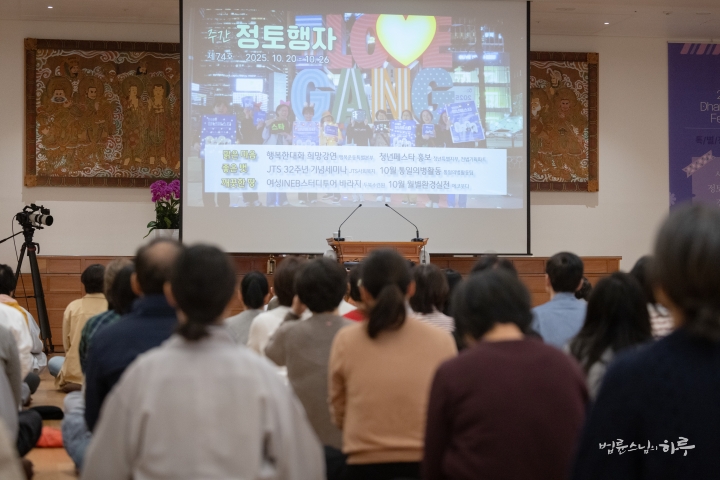
When the video ended, the assembly offered three prostrations and requested a Dharma talk from Sunim. Sunim began his Dharma talk by discussing the rapidly changing world, including climate change, the development of artificial intelligence, and the reorganization of the international order, and what perspective practitioners should maintain while living in such times.
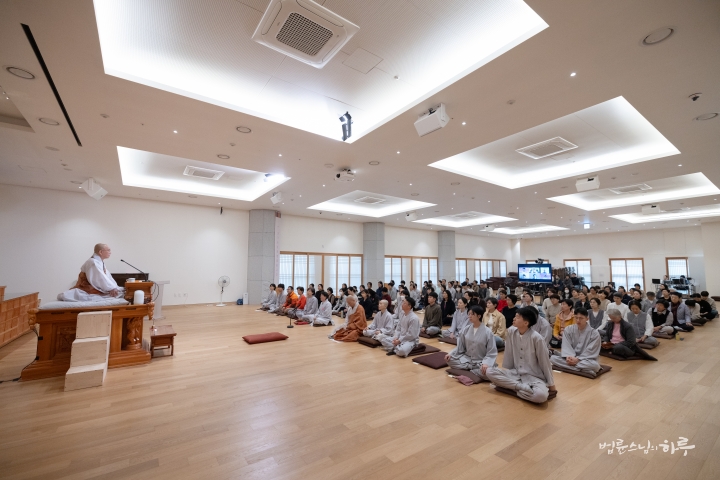
“It has been an unbearably long autumn monsoon. Korea has always been known for its distinct four seasons, with autumn characterized by high, clear skies and dry, refreshing weather. However, this year has seen an unusually long and humid autumn monsoon, causing significant damage to crops. With the kimchi-making season approaching, the cabbage and radish planted in the fields are suffering from soft rot disease and failing to grow properly. This year’s kimchi-making season might see kimchi becoming ‘gold-chi’ (expensive kimchi).
The Extended Autumn Monsoon: A Warning of Climate Change in Our Daily Lives
In the rice paddies, the delayed harvest is pushing back spring crop planting. In previous years, the harvest would have been completed by now, and it would be time to plant rye, wheat, or barley, but this year is different. With the delayed harvest, rice yields are decreasing, and losses are expected for next year’s spring crops as well. The garlic planting season is also passing, but the soil is too wet to even plant garlic. This extended autumn monsoon is causing various adverse effects throughout agriculture.
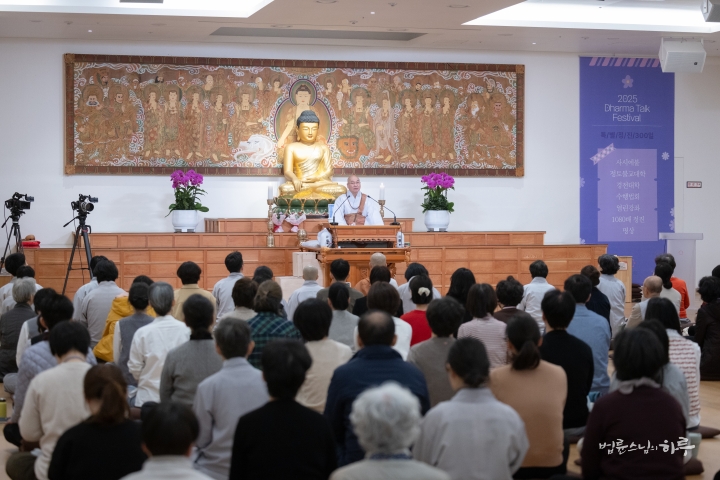
In my seventy years of life, I don’t think I’ve ever experienced such a long autumn monsoon as this year. Then, as soon as the monsoon lifted this week, temperatures plummeted, making it feel as if winter had arrived. Fortunately, this cold spell is expected to last only until today, after which we’ll return to normal autumn weather. In previous years, the mountains would have been beautifully colored with autumn foliage by now, but this year, lush green leaves still remain abundant.
Change occurs in every era. However, the world we live in today seems to be experiencing multiple changes occurring simultaneously more than ever before. Perhaps that’s why our familiar daily life feels increasingly unstable. The first change we feel directly is climate change. As temperatures rise year after year, existing ecosystems are rapidly changing. The main production areas for apples, pears, and chestnuts are moving northward, and forest vegetation is also changing. Rising ocean temperatures are causing changes in fish species as well. While we may not notice significant changes in our daily lives, from a perspective of a hundred or thousand years, this period would be evaluated as a time of rapid climate change.
The AI Era: Another Turning Point in Civilization
Second is the development of AI, or artificial intelligence. The emergence of AI will fundamentally change the way we have lived until now. Humanity has experienced several major turning points in civilization in the past. First, the invention of writing brought revolutionary development to human civilization by enabling the transmission of knowledge and technology without direct face-to-face contact. Additionally, the development of science and technology after the Industrial Revolution opened up new methods of production. Previously, we relied on human or animal power—natural energy—but after the Industrial Revolution, using artificial energy sources like steam engines and electricity brought about a major transformation in production structures.
In the industrial era, efficient labor based on knowledge and technology drove social development. However, the age of artificial intelligence is changing social structures in entirely different ways. The knowledge and skills we have acquired over decades are now stored not in our brains and bodies, but in external data centers. The age of artificial intelligence is one where we can access and use this knowledge whenever needed. This will bring about changes at a speed incomparable to the pace of development and efficiency we’ve seen so far. Rapid structural changes may also occur within human society. In this process, technological and wealth gaps between countries and social classes are likely to widen, intensifying polarization.
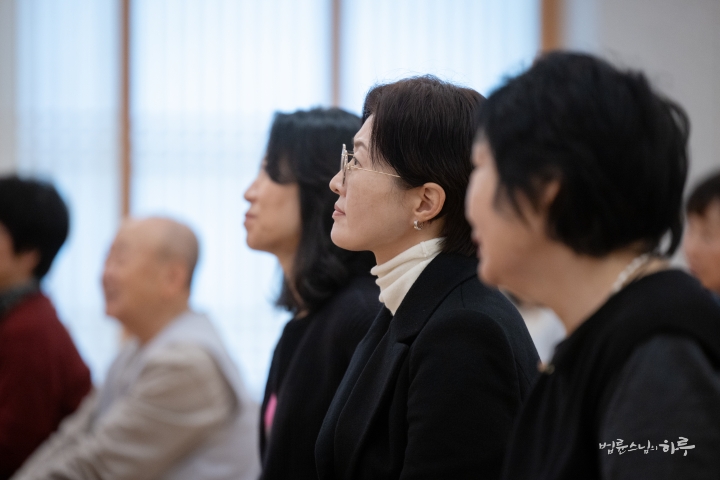
The world order is also being reorganized. As American influence weakens, new powers including China are growing stronger. It’s difficult to predict whether the world will maintain an American-centered order or transition to a multipolar era. However, America seeks to maintain its existing influence, while China and other emerging powers are moving to create an order favorable to themselves. Conflicts between these powers bring international tensions and sometimes become sparks for war.
In This Rapidly Changing World, How Should We Live?
In such a rapidly changing era, if we try to understand the world only through past experiences or familiar ways of thinking, it will be difficult to adapt to change. The world is not chaotic; rather, confusion arises because our cognitive framework for viewing the world cannot keep pace with the speed of change.
There is a story the Buddha told as a metaphor for life. A traveler being chased by an angry elephant in the wilderness discovered a well and escaped into it by grabbing onto a vine. However, the walls and bottom of the well were teeming with snakes, so he could neither cling to the walls nor descend to the bottom. As the traveler hung in mid-air holding the vine, a white mouse and a black mouse appeared and began gnawing at the vine. In this desperate moment, honey dripped from a beehive and touched the traveler’s tongue, and he became momentarily intoxicated by its sweetness. The Buddha said our lives are like this.
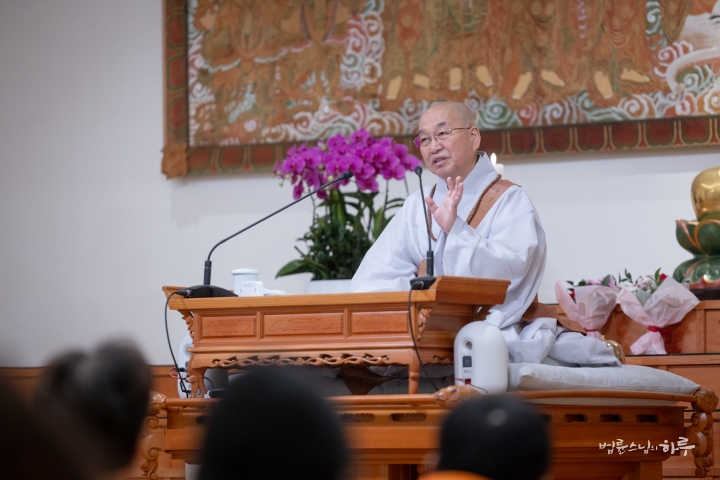
We live our lives day by day, but within them, change progresses rapidly. This doesn’t mean we should fear life. Rather, it means that if we lose our mindfulness, we can fall into confusion and be swept away by afflictions in such situations. Therefore, in times of rapid social change, we must see the world as it truly is according to the Buddha’s correct teachings, maintain our center, and actively respond to change. Active response doesn’t mean simply being dragged along by change, but adapting to new orders when necessary and sometimes creating changes that suit ourselves.
In times of rapid change like today, we need to maintain an attitude of ownership. Buddhism today can no longer remain merely a religion for praying for blessings or hoping to go to a good place after death. To solve the numerous problems and anguish before us, we must rely on the Buddha’s correct teachings, maintain our center, and actively respond to change. This is the perspective of the Middle Way spoken of in fundamental Buddhism, and the attitude of life that responds according to causes and conditions, which is called “No Everlasting Abiding Dharma” in Mahayana Buddhism.
However, if we cannot break free from the familiar framework of life we’ve lived in and continue to hold onto conceptual frameworks like “I must earn a lot of money” or “I must achieve high status,” it won’t be easy to find our center in life. If we become discouraged when our desires aren’t fulfilled or consider ourselves failures, that cannot be called a proper way of living.
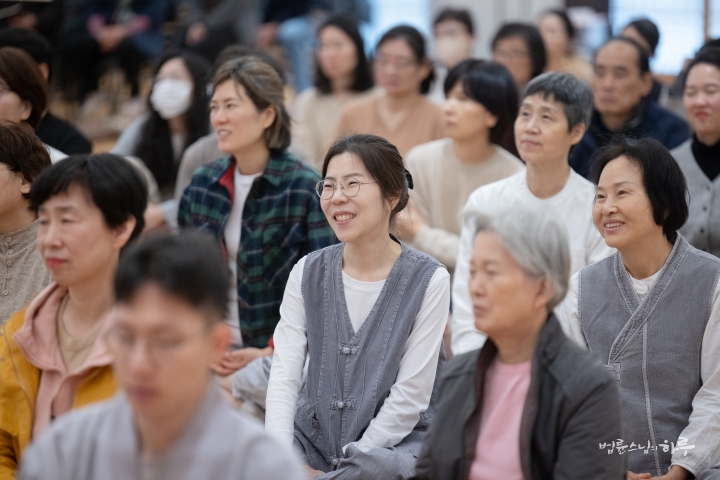
Even in the Buddha’s time, the world was experiencing extreme changes. In such times, the Buddha voluntarily renounced his throne and left home. He resolved his food needs through alms rounds, wore discarded clothes, and slept under trees. He chose his own life without being constrained by worldly changes. In this way, the Buddha first established individual freedom, then showed those suffering in the whirlwind of change a new path to escape from suffering. At that time, many people despaired and suffered as the existing order collapsed. To such people, the Buddha taught, “If you let go of what you’re clinging to, there will be no problem.” Suffering is not something that must be forcefully overcome. The Buddha led people to realize for themselves that there is originally nothing to suffer about. Through this realization, he guided them to maintain peace of mind and use their existence beneficially for the world.
This teaching from 2,600 years ago may be even more urgently needed for us today. I hope that each of you will diligently practice in your respective positions and live without losing your center even in this changing world.
Our Choice to Preserve Peace on the Korean Peninsula Amid U.S.-China Conflict
I have been working both internally and externally to facilitate dialogue between North Korea and the United States. If they don’t meet this time and try to meet later, there will be many processes to go through, such as deciding on the venue, agenda, and preliminary consultations. That’s why I think it’s good to seize this opportunity. Even if this meeting is just a brief handshake and exchange of a few words, like a ‘surprise show,’ it could serve as a catalyst for opening the door to serious dialogue. I conveyed a message to the North Korean side saying, ‘Let’s stop hesitating and engage in dialogue if possible,’ but whether this is part of North Korea’s strategy, they have not responded. So, to try to coordinate until the last minute, I postponed my flight to Bhutan by a few days and stayed in Korea until today, which is how I came to hold this Weekly Dharma Assembly.
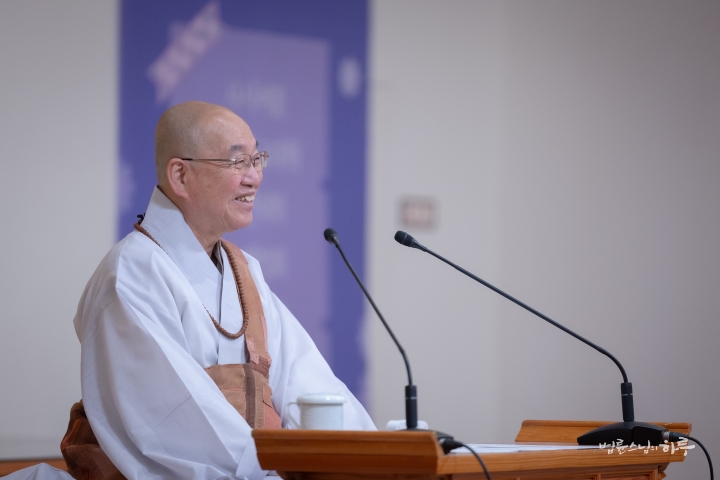
As such, things in the world sometimes work out and sometimes don’t. But one thing is clear: war must never break out on the Korean Peninsula again. Now it’s time to end the Korean War, and rather than debating whether we should be ‘one country or two countries,’ what’s more important is for the South and North to coexist peacefully. Unification is like marriage – it cannot happen if one side doesn’t want it. Just as forced marriage is a human rights violation and a crime, forced unification is also undesirable. While unification would be good if possible, what should take priority is coexistence through peace and cooperation.
In an era like now when U.S.-China hegemonic competition is intensifying, there’s a risk that the Korean Peninsula situation could be reduced to a subordinate variable in their conflict. As the saying goes, ‘When whales fight, the shrimp’s back gets broken,’ we cannot rule out the possibility of conflict arising again. However, such misfortune must never be repeated. While we cannot prevent the U.S.-China conflict itself, we must ensure that war does not break out on the Korean Peninsula and that the South and North respect each other and cooperate.
In this regard, dialogue between North Korea and the United States, and between the United States and Japan, is very important. Rather than being dissatisfied that South Korea is excluded from these dialogues, we must first let go of the fixed idea that North Korea-U.S. or U.S.-Japan dialogue excluding South Korea is unacceptable. We must move beyond the competitive structure of arguing over which is the more ‘legitimate state.’ What’s more urgent for us now is to first think about what choices would help peace on the Korean Peninsula. And on that foundation, we should seek unification through coexistence and cooperation between the South and North.
Jungto Society has been continuously carrying out activities for peace and unification on the Korean Peninsula for over 30 years since its founding. While there may be policy changes according to the trends of the times, we will continue to maintain the following three major directions unchanged. First, preventing war from breaking out again on the Korean Peninsula and preserving peace; second, alleviating the suffering of North Korean residents even a little; third, resolving the confrontation and conflict within South Korean society surrounding these issues. These three things are a shared dream that we who were born in the Republic of Korea should pursue together. Jungto Society will continue to maintain this perspective unwaveringly and steadily walk this path.”
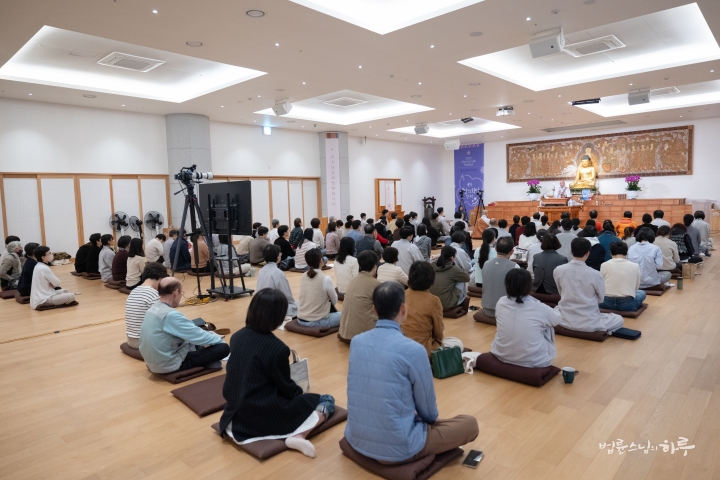
Next, Sunim received questions from people who had signed up in advance. Two people asked Sunim questions online and had conversations with him. One of them asked Sunim about wanting to know more about actual life in North Korea to help North Korean defectors in the future.
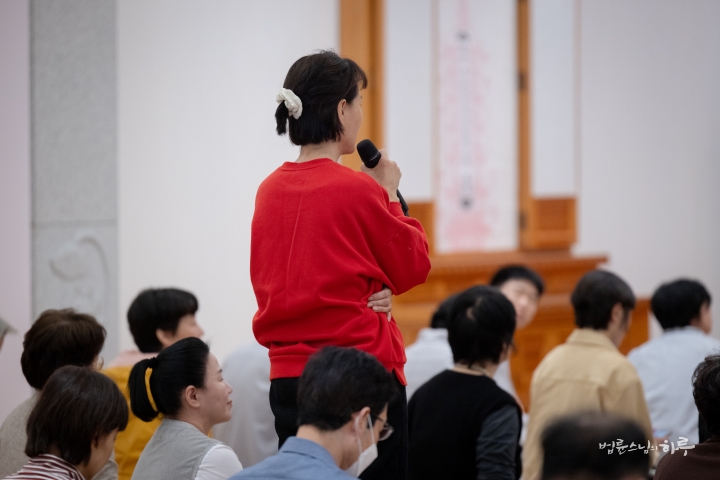
Are North Korean Defectors Really Like the Image We Have of Them?
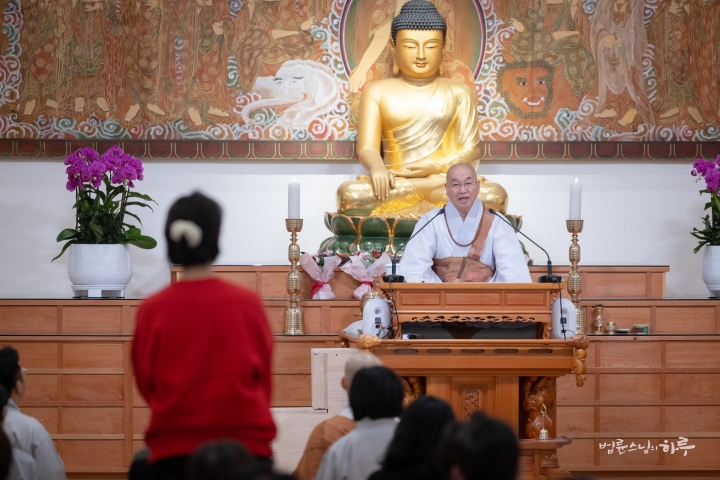
“North Korea and we are the same people. However, regardless of our will, the Korean Peninsula was forcibly divided along the 38th parallel by the United States and the Soviet Union. As a result, different governments were established in the South and North in 1948, and after the Korean War broke out in 1950, an armistice was reached in 1953. Since then, South and North Korea have existed as virtually two independent countries, and in the early 1990s, they simultaneously joined the United Nations (UN).
In this process, South Korea developed based on liberal democracy and capitalism through its relationship with the United States. On the other hand, North Korea pursued a socialist system, but when the Soviet Union and Eastern European bloc collapsed, it lost its major trading partners and faced economic difficulties. As a result, the economy rapidly declined and faced very difficult circumstances.
Until the 1970s, North Korea had stronger military power, economic power, and international diplomatic power than South Korea. The fact that North Korea invaded the South during the Korean War was probably because they judged they had a good chance of winning. That’s how much stronger North Korea was, and it can be said that they developed much faster than South Korea. Although both sides were devastated by the war, North Korea quickly recovered through its self-reliance system. However, as South Korea began economic development in the 1960s, the economic levels of the South and North became similar by 1972. Eventually, South and North Korea came to mutually recognize that neither side could gain military superiority over the other, which led to the July 4th South-North Joint Statement in 1972. This statement, signed by President Park Chung-hee and Chairman Kim Il-sung, was an agreement to avoid armed conflict and resolve issues through peaceful means.
However, in the 1990s, as the Eastern European socialist bloc collapsed, the North Korean economy entered a serious recession. The generation currently under 35 in North Korea has experienced much hardship. They grew up seeing people starve to death. On the other hand, those currently in their 50s and 60s are a generation that lived well, singing and dancing. While there are differences depending on family circumstances, on average, North Korea’s younger generation has experience begging in markets and living in hardship. In contrast, the generation over 45-55 attended school well and received basic education. Since North Korea implements compulsory education through high school, it’s very rare for anyone not to attend school. There are even schools in orphanages. North Korea doesn’t have the concept of high school; their middle school curriculum includes what we consider high school. The system consists of elementary school, middle school, and university in that order.
The military service system is also slightly different from South Korea. Regular soldiers serve for 7 years, while officers and cadres serve for 13 years. While their lifestyle of dancing, singing, and playing is similar to ours, North Korea is all about ‘state-first principle’ and ‘Korea-first principle,’ so residents think North Korea is the best in the world. Of course, North Korean defectors don’t think this way, but internal residents follow their leader as people in the past showed loyalty to their king.
The daily life of North Korean defectors is not very different from ours. Just as ethnic Koreans in China maintain traditional food culture, North Korean residents live similarly to us in their daily lives. Understanding it this way, you can see North Korean society and residents’ daily lives more realistically. Of course, during the economic crisis, some family members even starved to death. Unable to endure, they fled to China and entered South Korea, and in the process, everyone carries deep wounds in their hearts. If you listen to each person’s story, there are so many tales that each could be made into a novel.
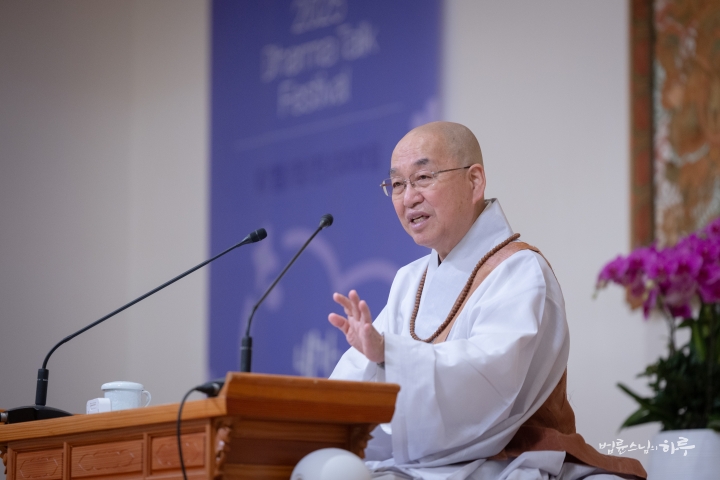
Our people have historically had quite an optimistic disposition. Even though they live with pain in their hearts, they have the strength to continue their daily lives with smiles on the outside. But that doesn’t mean the pain disappears. Like displaced persons, the longing for hometown and family always remains in their hearts. Most displaced persons in South Korea came down around the Korean War, so many are now elderly or have already passed away. In contrast, many defectors have entered South Korea relatively recently, so young people have left their parents in their hometown, and elderly people have often left behind children or family members. Everyone lives with their own longing and pain. However, our ancestors were originally people who knew how to have fun. During holidays, they would make songpyeon together, gather whatever ingredients they had to share simple food, and enjoy time together. It’s easier to understand if you think about the lives of rural people in the old days.
So there’s no need to simply pity defectors. They are just having difficulty adapting to a new social system, and what we can do is help them a little in that process. Excessive sympathy can actually hurt their pride. Just as we don’t pity Korean Americans, people from North Korea are simply in the process of settling in an unfamiliar environment. We must remember that it’s no different from the difficulties Koreans face settling in America.
Currently, many foreign workers have come to live in our country. Of course, they also live with difficulties in Korea, but we can’t just see them as pitiful. Most were quite smart and diligent people in their own countries, which is why they were able to come to Korea. Rather, people with insufficient abilities in their own countries find it difficult to even get opportunities for overseas employment. What these foreign workers find most difficult is discrimination. These people generally lived above-average lives in their own countries and live with pride in Korea as well. However, there is somewhat of an atmosphere in Korean society that looks down on restaurant workers or factory laborers, and especially at construction sites, profanity and rough behavior are frequent. This culture becomes a great wound to foreigners. Nevertheless, because the wages they receive in Korea are much higher than in their home countries, most people with high school education or above come to work in Korea. So rather than simply doing ‘hard work,’ the experience of not being respected and being ignored becomes a greater pain.
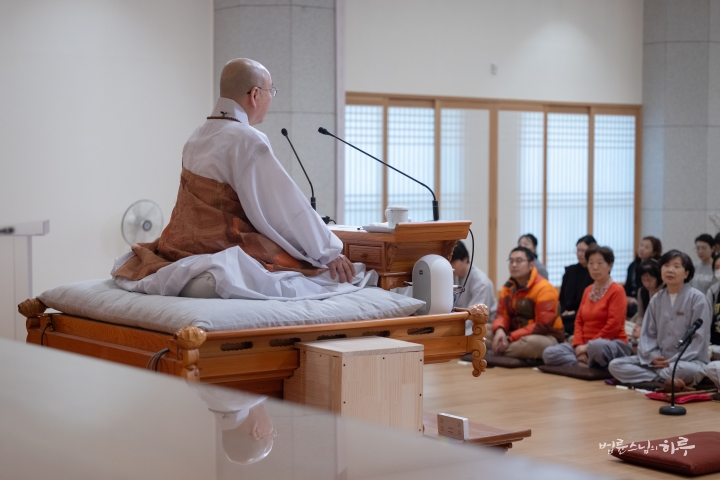
These days, various types of ethnic Koreans from China come in, but in the past, many were leaders in their society. So when they were ignored in Korea, they felt strong resistance. It’s similar with Koryo-saram (ethnic Koreans from Central Asia). Their ancestors participated in the independence movement, but they complain a lot about being ignored in Korea as their descendants. It’s a phenomenon that appears similarly in any society.
So when talking with North Korean defectors, it’s important to have an attitude of respect rather than pity. Since they have difficulties settling in Korean society, just think of becoming their friend. While material help was needed initially, most can now support themselves. People from foreign countries often live better than poor people in Korea. While people born in Korea who can’t adapt have no remedy, those who have migrated can live much better lives than in their own countries with just a little effort.
However, about 20-30% of those from North Korea have mental illness or trauma. This is because they’ve experienced difficult things like family members dying. In such cases, they may have difficulty adapting to society, but except for a small minority, most settle well into Korean society. Even if pain remains in their hearts, they live while suppressing it internally. So just as rural people feel bad when Seoul people look down on them, what’s most important is not to discriminate against or ignore North Korean defectors by saying ‘they’re from North Korea’ or ‘they’re foreigners.’
Every year during kimchi-making season, Good Friends invites North Korean defectors and holds a kimchi festival. We make kimchi together, and the North Korean defectors come from all different regions. So just as Gyeongsang Province kimchi and Jeolla Province kimchi are different, Pyeongan Province kimchi and Hamgyong Province kimchi are also different. About 60 percent of the migrants are from Hamgyong Province. This is because it was easy to cross into China from Hamgyong Province, but difficult to cross from Pyeongan Province because the Yalu River is wide. The rest are from Hwanghae Province, Gangwon Province, Yanggang Province, and Jagang Province.
Currently, about 35,000 North Korean defectors live in South Korea. Some of them felt discrimination in South Korea and emigrated to Canada or the UK. Several hundred live in each of the UK and Canada, and some also reside in the United States.”
“Yes, thank you. I understand well.”
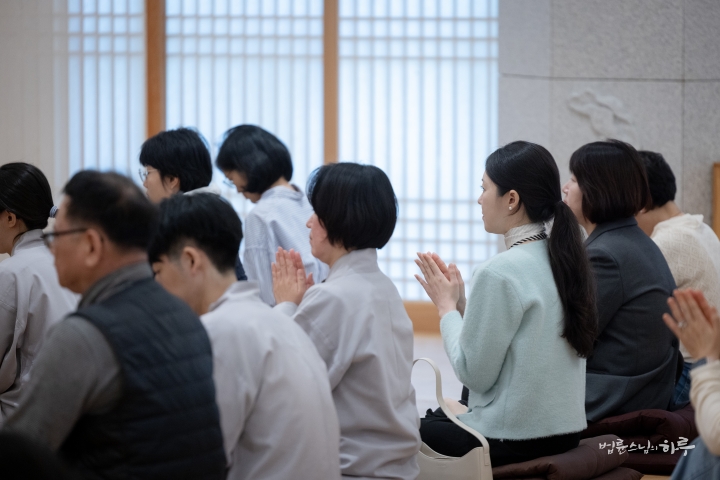
After finishing the conversation, it was 11:30 AM. The Weekly Dharma Assembly concluded with the Four Great Vows, with plans to meet again at the same time next week.
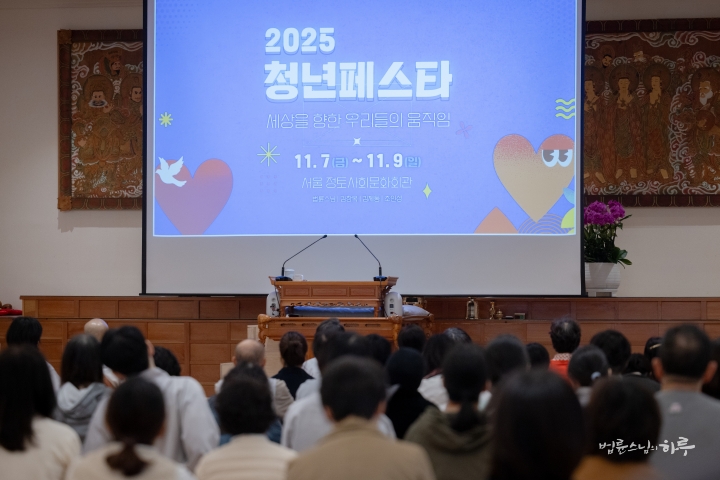
The participating Jungto Society members continued with mindful sharing in their groups, while Sunim moved to the basement dining hall for lunch.
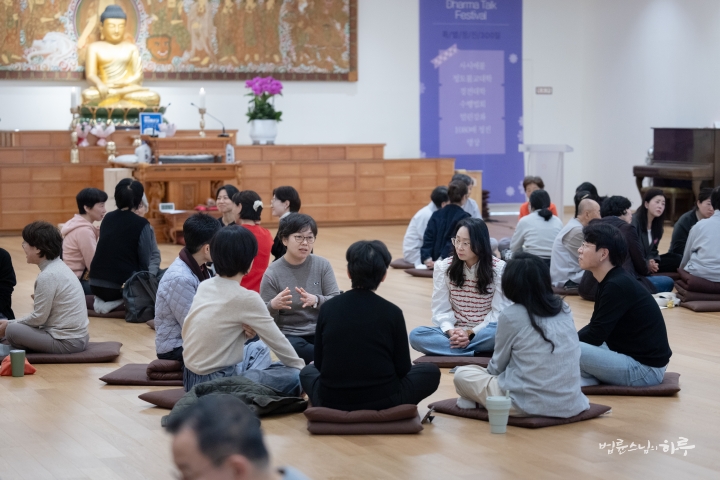
After finishing the meal, Sunim had a meeting with Director Kwon Young-sun of The Peace Foundation at noon, followed by a promotional video shoot for the Youth Festa at 1 PM.
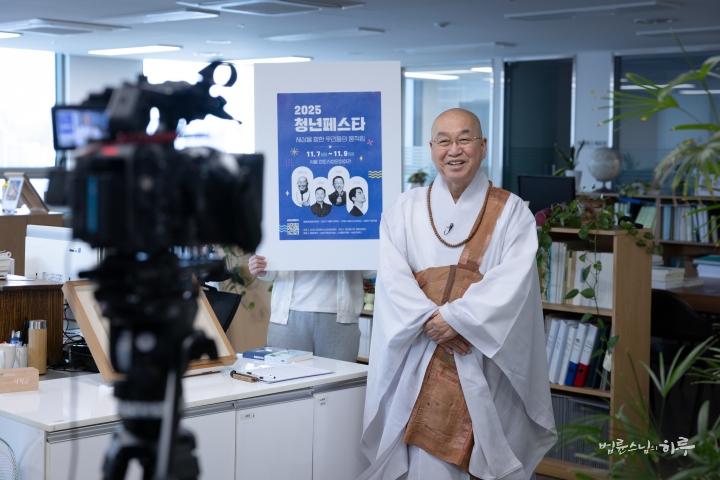
Jungto Society organized the ‘Youth Festa’ to provide some help to young people who are wandering and experiencing confusion. Sunim personally filmed a video message introducing the Youth Festa to encourage young people who subscribe to his social media to participate in the event.
“I invite all young people to the Jungto Social and Cultural Center. This time, at our Jungto Social and Cultural Center, we have prepared a ‘Youth Festa’ where young people can freely enjoy, talk, eat, and play. I will also have time for free conversation with you. Additionally, there will be a lecture by Kim Je-dong, whom you all love. Counseling expert Kim Chang-ok and actor Jo In-sung will also join us. Besides these, various speakers will come to conduct lectures, seminars, conversations, and play programs. Of course, as this is an event held at a temple, meditation programs are also prepared.
Youth Festa, Eat, Play, and Talk to Your Heart’s Content!
We have prepared various opportunities for you to enjoy comfortably and freely here. Don’t just stay at home – come here and take time to look at not only personal problems but also the problems of the world. Young people, I hope you enjoy yourselves to the fullest at the Jungto Social and Cultural Center. I invite you all here.”
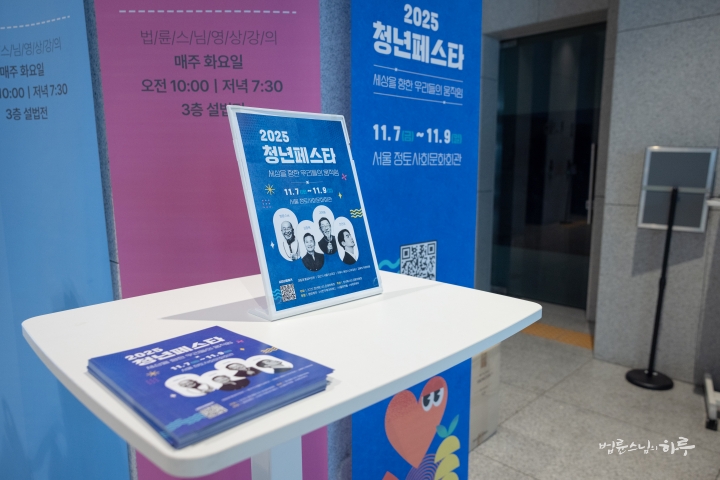
After finishing the video shoot, at 2 PM, Sunim held a meeting with the JTS Secretary-General to discuss how to support refugees living in difficult conditions on the Myanmar-Thailand border. Following Sunim’s direct field visit in mid-September, new support requests had come from the field. After discussing what support JTS would provide for the requested items, the meeting concluded.
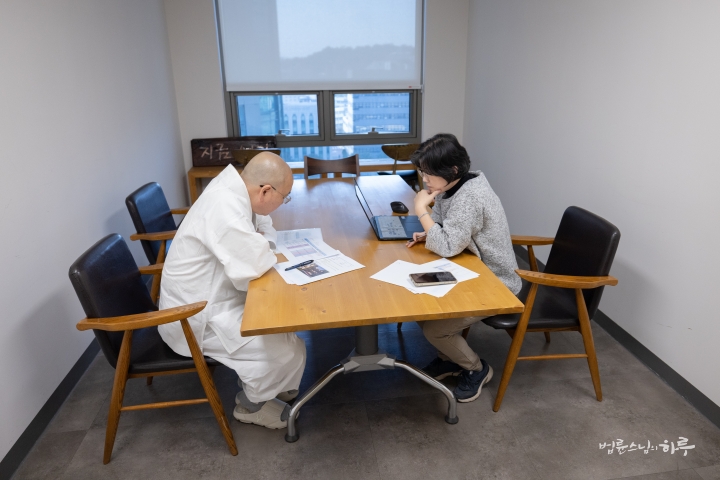
In the afternoon, Sunim packed luggage for the trip to Bhutan. Starting tomorrow, he plans to spend a week surveying the Zhemgang and Trongsa regions of Bhutan, attending completion ceremonies and meeting with residents. He gathered and packed the necessary items for these activities.
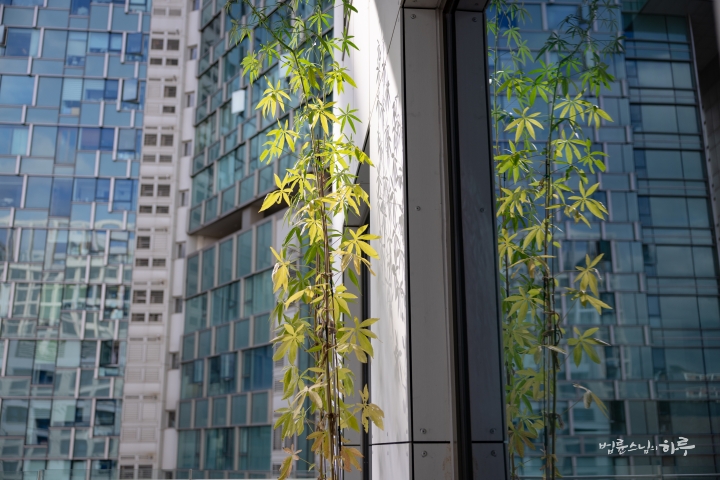
After sunset, Sunim spent the evening indoors proofreading manuscripts and handling administrative work before concluding the day’s activities.
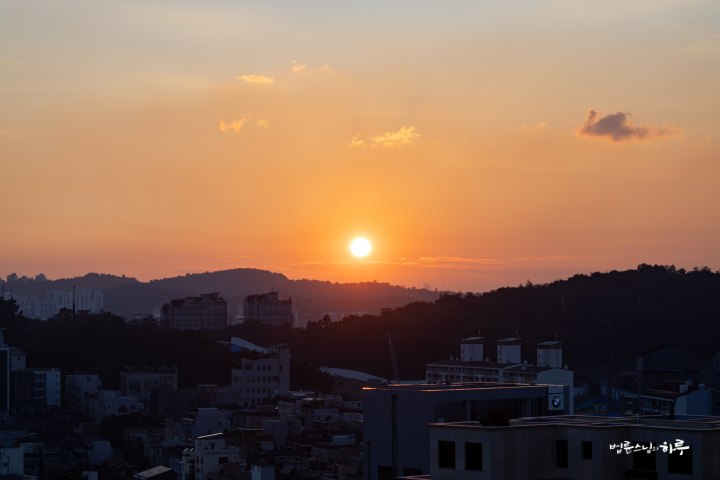
Tomorrow morning, Sunim will have an interview with JoongAng Ilbo about the ‘Youth Festa,’ followed by an evaluation meeting with staff members who managed the Women’s INEB program. In the afternoon, he will travel to Incheon Airport to depart for Bhutan.





